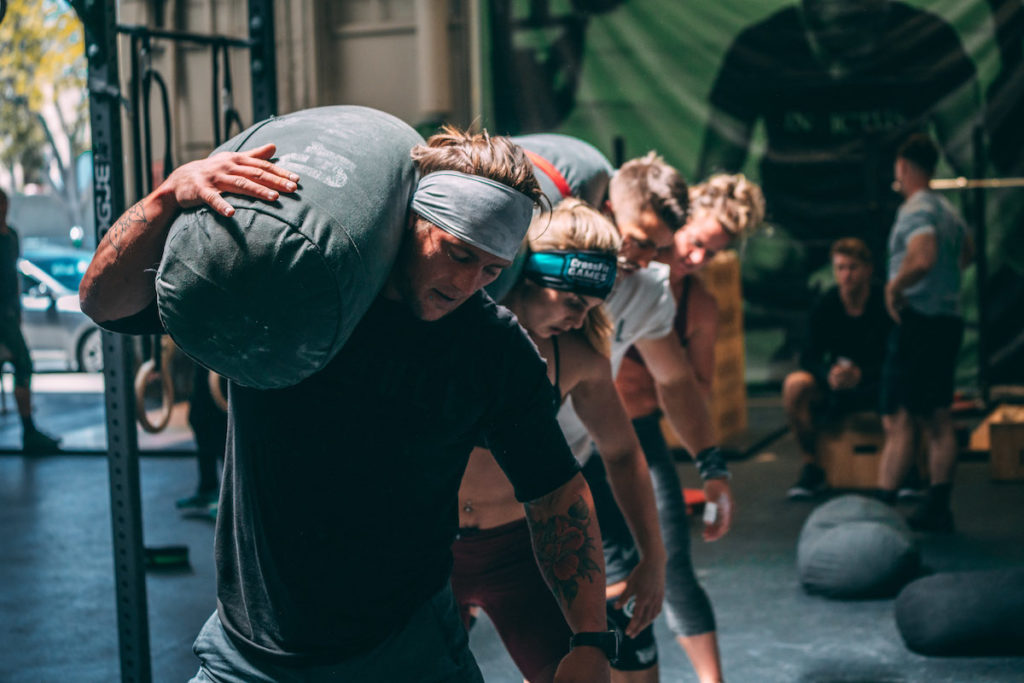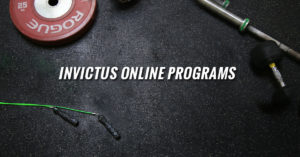
Characteristics of Invictus Athletes & Masters Competitors
Written by Nichole Kribs
What makes someone a competitive athlete? Do competitive athletes have similar characteristics? These are great questions to ask if you’re either coaching competitive athletes or are trying to aspire to be a more competitive athlete.
Invictus is a really unique place in that we are fortunate to work with many competitive athletes who either use the Invictus methodology in their home gym or physically train at Invictus. That means that we have had many opportunities to not only help athletes become more competitive but also help maintain that competitive edge with athletes. The years of working with competitive athletes, including Masters, has shed tremendous light on answers to the above questions.
Below are the top three characteristics we’ve seen in our competitive athletes that have helped them in their CrossFit career:
1. Mental Focus
Mental focus is imperative when being a competitor. This mental focus is not just within a competition but transcends into all aspects of training (and life).
These competitors go to the gym with a purpose and know exactly what their training is going to be for the day. They know what their warm-up routine will be, what mobility drills they need to incorporate and have most likely visualized their training session. Practicing this mental focus in training can then help them when it comes to competition and when mental focus is absolutely necessary in every event.
Any athlete, but especially Masters athletes, are faced with stressors like family life, career, maintaining relationships, caring for loved ones or other responsibilities. This means that, as a competitor, they must be able to take those stressors and put them aside for the 90-120 minutes of training by having superb mental focus during the training session.
I have never seen anyone so mentally dialed in during their training session as I do with competitors.
2. Quality Over Quantity
Quality training is critical in an athlete’s success. Anyone can slam you with volume and tell you to ‘toughen up, this is CrossFit so you need to handle all the volume’.
It takes coaches who’ve had experience working with athletes to know that yes, volume is important, but what beats volume is quality programming and training. This is twofold for competitive athletes. Quality training can mean:
Quality programming. Having a well thought out training plan designed for an athlete’s specific needs, with proper peaking and proper volume specific to that athlete, will have tremendous results.
Quality training session. Athletes who aspire to be competitive should use their training sessions as their practice session (just as you would in training for a specific sport).
The aforementioned mental focus comes into play here. Athletes who want to be or are competitive should be present in their training session with clear intentions for every portion of their session (from the warm-up to the cool-down). Ninety minutes of quality training is way more efficient than 2+ hours of being interrupted every few minutes of training by gym members, checking your phone for messages, etc.
This is even more important for Masters athletes. Let’s face it; being a Masters athlete means that you aren’t recovering like you once did in your twenties. That means that not only do you need to maximize recovery but you also must look at the quantity of your training.
Yes, competitive athletes, even Masters, can often handle a lot of volume, but that doesn’t mean that is good for them over a long period of time. We have our Invictus Masters competitors focus on having a very quality training session instead of rushing through the session just to make sure they get everything in with a time-crunched schedule. This helps save their body over time as the years of training begin to pile up. Quality always wins over quantity.
3. They Enjoy Training
The CrossFit season is long so if an athlete isn’t enjoying the process then that athlete is going to have a hard time being on top of their game when it matters. There will be hard days and hard periods of training, but if an athlete is not enjoying the process of developing into a better version of themselves, then training at that level won’t be sustainable.
It is crucial to have an element of enjoyment with training. That doesn’t mean that athletes sacrifice their competitiveness because they are just having ‘fun’ on the competition floor.
You can look at someone like Tom Brady and know that his love of football continues to be a motivating factor for him to still be playing at the age of 40 – and he is one of the most competitive quarterbacks in NFL history.
Enjoying training does mean that an athlete ultimately loves what they are doing and that desire helps fuel them when training feels redundant.
This same principle applies to our Masters athletes. Working with the Invictus Masters Program has given me a new perspective on training and competing. Our Masters athletes are very accomplished in their own rights. They have children, grandchildren, a career they love/loved, are approaching retirement, have traveled, etc. They have a high level of fulfillment and satisfaction with their life so being able to compete is just the cherry on top; a bonus. Competing for many of them is fun. Learn More About the Invictus Masters Program.
This doesn’t mean that they aren’t putting in hours of training and dedicating resources into helping them be their best. However, for many Masters competitors, the need to prove themselves just isn’t there like it was in their late teens or early twenties. Instead, just having the platform to compete on such a large stage like the CrossFit Games is beyond satisfying.
It becomes obvious when a Masters athlete (or any athlete) starts to get caught up in the competition and is not enjoying their training anymore, their performance actually suffers. So continuing to enjoy the process of becoming a competitor versus needing to be a competitor in order to prove something is a major characteristic I see in the success of athletes.
There are obviously other characteristics that identify competitive athletes but these three are ones that we see across the board in all our competitive athletes.
If you’re interested in competing at any level, learn more about Invictus Athlete!
